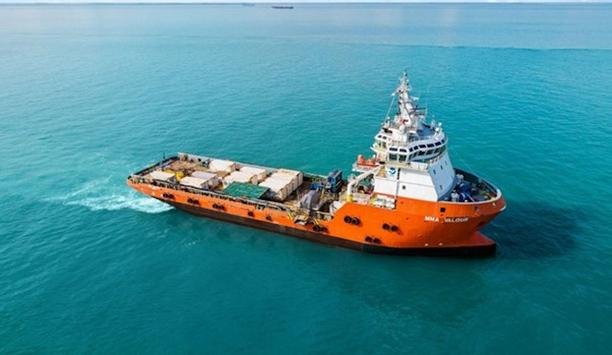MacGregor bulk handling systems for offshore supply vessels (OSVs) are specialized solutions for the safe and efficient transfer of dry and liquid bulk cargoes. These systems are a critical part of the offshore supply chain, enabling OSVs to transport materials such as cement, barite, and bentonite to drilling rigs and platforms. The design of these systems prioritizes high-volume transfer, safety, and environmental protection in the demanding offshore environment.
Working Principle
MacGregor offers two primary types of bulk handling systems for OSVs:
- Pneumatic Dry Bulk Systems: These systems use compressed air to pneumatically convey dry powders.2 The traditional method uses pressurized tanks (P-tanks) for both storage and discharge.3 A more modern and space-efficient concept, pioneered by MacGregor, uses separate units for storage and discharge.4 In this “hopper and blow pump” system, the dry bulk is stored in a non-pressurized hopper and then transferred to a blow pump. The blow pump uses compressed air to fluidize the powder and “blow” it through the piping to the offshore installation. This method offers a significant increase in bulk capacity and reduces the risk of clogging.5
- Liquid Bulk Systems: These are dedicated pump and piping systems for liquid cargoes such as drilling mud, fuel, and fresh water. The systems are designed with high-capacity pumps to ensure rapid and efficient transfer.
Components and Advantages
The components of MacGregor’s systems are robust and designed for longevity in a harsh marine environment.6
- Dry Bulk Components: Pressure vessels or hoppers, high-efficiency compressors, MacGregor’s patented 2-Way valves to simplify piping and reduce clogging, and a fully enclosed piping network.
- Liquid Bulk Components: Dedicated centrifugal or positive displacement pumps, flow control valves, and specialized manifolds for connection to the offshore rig.
The advantages of these systems are significant:
- Increased Capacity: The hopper and blow pump concept can increase bulk capacity by 50-70% by using non-pressurized, rectangular hoppers integrated into the vessel’s hull.7
- Safety and Environmental: Totally-enclosed systems minimize dust emissions and the risk of spills, ensuring compliance with strict offshore regulations.8
- Efficiency: Automated controls and simplified piping reduce transfer times, improving the vessel’s turnaround in port and at the offshore rig.
- Reduced Maintenance: Simplified piping and robust components lead to lower maintenance costs and greater operational reliability.9
Maintenance and Spares
Maintenance focuses on the components that handle the abrasive bulk materials and the pressurized air.
- Compressors and Pumps: Regular maintenance and overhauls of the compressors and liquid pumps are essential.
- Valves and Piping: The system’s valves and piping must be inspected for wear and tear from the abrasive flow.
- Safety Devices: Regular checks and calibration of pressure relief valves and safety interlocks are critical.
Common spares for these systems include seals, gaskets, replacement valves, filters for the compressors, and pump impellers or components.
MacGregor’s bulk handling systems are a cornerstone of offshore supply operations, providing the efficiency, safety, and reliability needed for the demanding logistics of the oil and gas industry.

